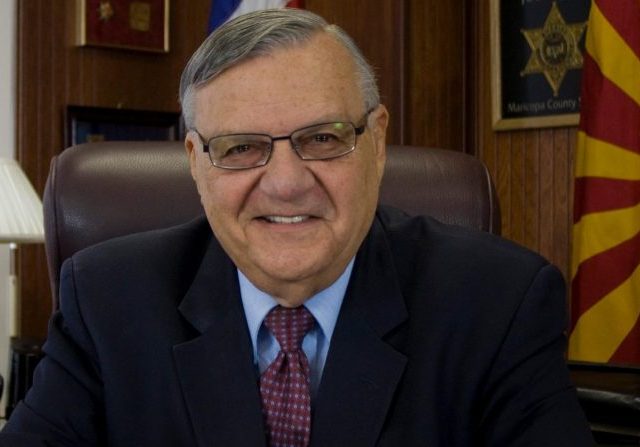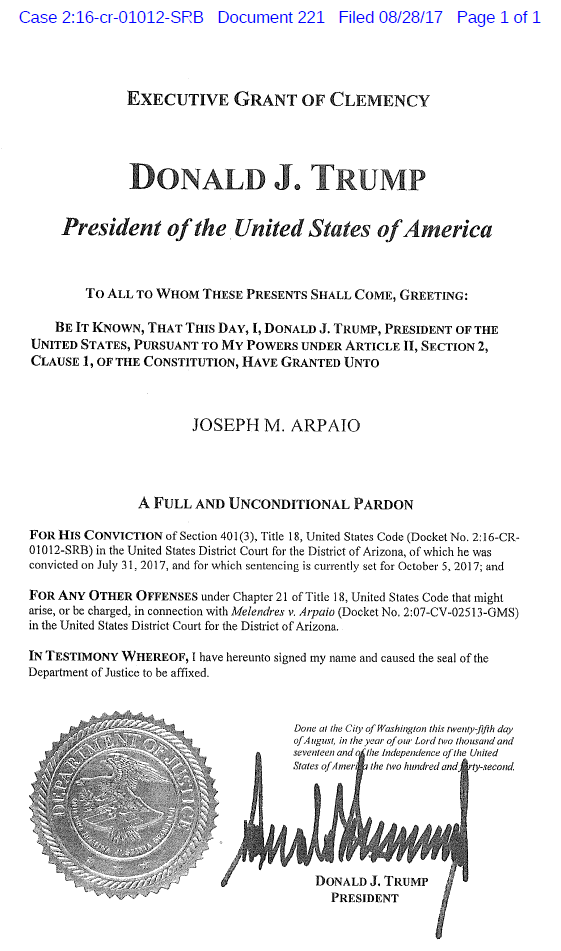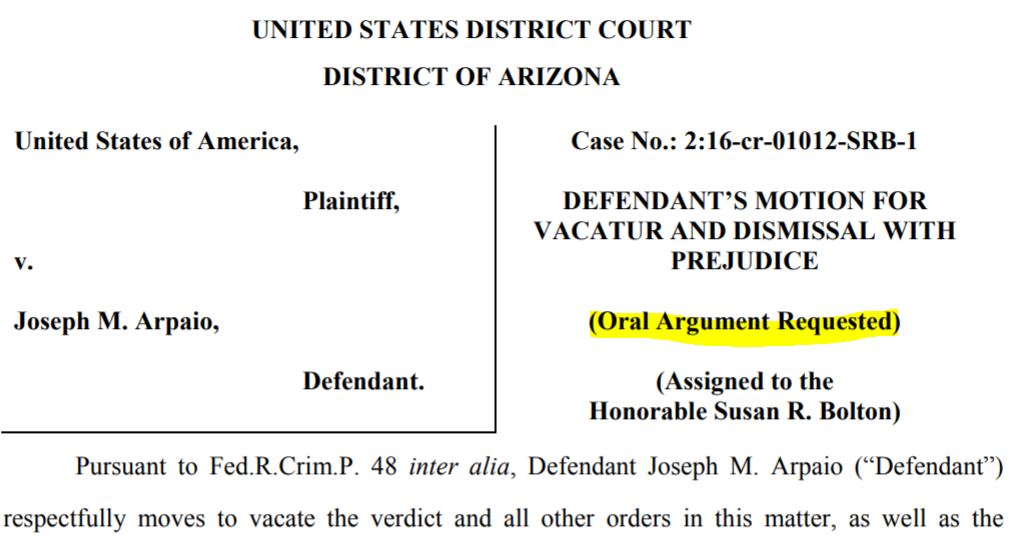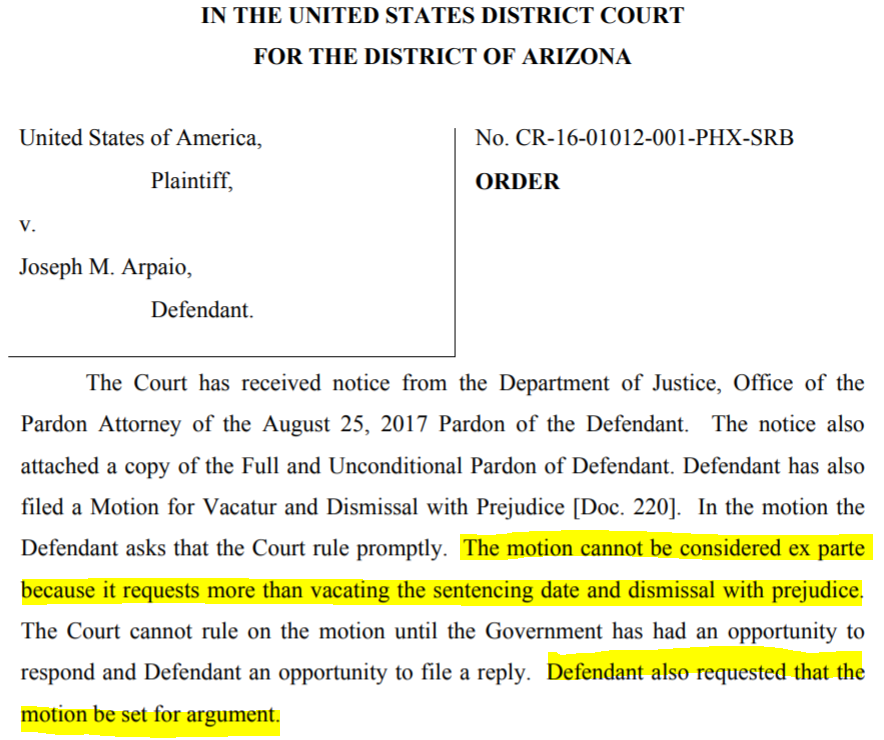Overblown hype about Court scheduling oral argument in dismissal of Arpaio conviction
Arpaio seeks to vacate more than his conviction, and Arpaio’s own lawyers requested oral argument

Former Sheriff Joseph Arpaio was found guilty on July 31, 2017 (pdf.) of criminal contempt of court by Judge Susan Bolton in Arizona federal court.
Last Friday, August 25, 2017, President Donald Trump issued an Executive Clemency of Arpaio, which was filed in the case on August 28:

Arpaio then filed a motion to vacate (pdf.) the conviction and dismiss the case against him and for related relief.
Specifically, Arpaio sought not only to have the conviction vacated, but all other Orders in the case:
Pursuant to Fed.R.Crim.P. 48 inter alia, Defendant Joseph M. Arpaio (“Defendant”) respectfully moves to vacate the verdict and all other orders in this matter, as well as the Sentencing on October 5th, and to dismiss this matter with prejudice. This Motion is made on the grounds that on August 25th, 2017, the President of the United States of America issued a full and unconditional pardon of Defendant. A copy of the Executive Grant of Clemency is submitted to the Court as Exhibit “A” hereto, and incorporated as if set forth herein. The President’s pardon moots the case, and it warrants an automatic vacatur of all opinions, judgments, and verdicts related to the criminal charge….
The Judge in the case, who made the criminal contempt finding, has issued an order (pdf.) to hold oral argument on the motion to dismiss, as the Arizona Republic reports, Judge won’t vacate Arpaio’s contempt conviction without oral arguments:
U.S. District Court Judge Susan Bolton canceled former Sheriff Joe Arpaio’s upcoming sentencing hearing for his criminal contempt-of-court conviction, telling attorneys not to file replies to motions that were pending before Arpaio’s recent presidential pardon.
However, Bolton on Tuesday stopped short of throwing out the conviction based solely on Arpaio’s request. Instead she ordered Arpaio and the U.S. Department of Justice, which is prosecuting the case, to file briefs on why she should or shouldn’t grant Arpaio’s request.
Arpaio’s attorneys asked Bolton on Monday to vacate Arpaio’s conviction in light of President Trump’s Friday pardon.
Bolton has scheduled oral arguments on the matter for Oct. 4, the day before Arpaio was supposed to be sentenced.
Mark Goldman, one of Arpaio’s attorneys, said, “We look forward to the hearing, and hope that the court will make the appropriate ruling. The verdict should have been set aside by the court already and prior to the pardon for the reason that it was never delivered to Sheriff Arpaio in open court, but instead sent to his attorneys via email, thus violating his constitutional rights to a public trial and to participate in his trial.”
Goldman told The Arizona Republic Arpaio will appeal if the judge does not vacate all decisions in the case.
“We don’t know if the court will,” he said. “And if they don’t, we’ll be appealing, but hopefully this will just put this to rest.”
This report has led to furious speculation that the Judge will contest the legal effect of the pardon on Arpaio’s conviction.
Leading this charge is Jennifer Rubin of the Washington Post, who writes Legal challenge to Arpaio pardon begins (italics in original):
After President Trump’s pardon of ex-sheriff Joe Arpaio, who had been convicted of criminal contempt for violating a court order designed to stop the violation of the constitutional rights of suspected illegal immigrants, conventional wisdom — and certainly the Trump administration — would have us believe that Trump’s pardon powers are unlimited. However, never before has someone stretched the pardon power so beyond its original intent. Trump has now drawn scrutiny not simply from critics of his racist rhetoric but from the court itself.
[quoting Arizona Republic article linked above]
In other words, this is no slam dunk….
[Ian Bassin, executive director of Protect Democracy] notes, “Judge Bolton may want to see how the honorable lawyers of DOJ’s public integrity section respond personally in open court — themselves as officers of the bar who’ve taken an oath to uphold the Constitution — to the blatant abuse of power by their boss.” He adds, “After all, these are people who’ve dedicated their lives and careers to ensuring our public officials act with integrity and Joe Arpaio and now the President of the United States have spit in the face of that.” Bolton’s hearing will venture into uncharted territory, a voyage necessitated by Trump’s utter disregard for the rule of law and his constitutional obligations to enforce the Constitution and laws of the United States.
The Project Democracy letter and position is here.
This hype suggesting the Judge intends on questioning the legal effectiveness of the pardon as to the conviction appears to be nothing more than partisan speculation. While I can’t read the Judge’s mind, I can read the record and the Judge’s Order setting the hearing.
Here is the sequence.
Arpaio’s lawyers filed the pardon with the Court at the same time they filed the motion to vacate the conviction and for other relief. That is critical to the Court setting oral argument. In the motion, Arpaio’s lawyers even asked for oral argument on the motion:

The Court issued an Order (pdf.) scheduling oral argument because the relief sought went beyond vacating the conviction and sentencing, and also because Arpaio’s lawyers requested oral argument:

Again, I can’t read the Judge’s mind, but the scheduling of oral argument does not appear to be controversial or unexpected — Arpaio seeks to vacate not just the conviction but all prior orders in the case, and Arpaio’s own lawyers recognized that oral argument would be needed and so requested.
In other words, the hoopla about the scheduling of oral argument appears to be just political hype.
 DONATE
DONATE
Donations tax deductible
to the full extent allowed by law.








Comments
This is a true “nothingburger”…
with crappy Collectivist legal writer special sauce.
I’ve always seen the need for the pardon was the possible need to grant pardons as a way to negotiate the end of an illegal insurrection.
Nothing Trump has done could possibly generate a true level of animus that such a situation could produce, so this talk about “unlimited” is such humbug.
From a box of which brand of cereal did this Ian Bassin person get his law degree?
He may not be stupid, but just corrupt, misrepresenting the law to push the progressive agenda.
Ran across a story that’s a little off topic here, except insofar as it’s something that absolutely needs some federal investigation;
Our old friend Linda Sarsour has gone online to supposedly raise funds for Texas Disaster Relief – but guess what? All of the donations made are going straight to her political action committee; not a dime is going to go to any actual victims.
https://www.weaselzippers.us/355211-linda-sarsour-soliciting-donations-for-liberal-political-group-masquerading-as-harvey-relief-fund/
The judge is free to hold a hearing prior to granting
Arpaio’s request for vacature and dismissal with prejudice. And, as the pardon was issued before sentencing and appeal, I see no way the judge can refuse to vacate the conviction. As to vacating the prior orders in the case, the pardon does not specify he is now exempt from previous orders issued in the case, except for the one(s) which led to his conviction on 31 July, 2017. It specifically grants him immunity from any future actions arising out of the specified case and its attendant judicial orders. So, even though the prior orders, directed solely at Arpiao can be said to no longer apply and can be vacated, those which also name the Maricopa County SO and other members of the organization, specifically, may not be able to be vacated, as they apply to entities not covered in the clemency order.
So, if the judge decides to allow previous orders addressed to multiple parties to stand, it will be up to Arpaio to decide if he wishes to proceed to the SCOTUS with the same motion or to appeal his conviction. Whatever happens, Arpiao will not be subject to further judicial action based upon this court case. It will be interesting to see what happens here.
I’m going to raise a legal quibble here with the Prof.
My understanding of “clemency” is that it is NOT a “pardon”, but only a grant of relief from the full effects of a sentence that leaves intact the conviction of a crime.
A pardon expunges the conviction.
Certificate says “Executive Grant of Clemency” and “A Full and Unconditional Pardon”. If the two are different things, why the two phrases?
IF those are the same thing, why all the lily gilding?
It doesn’t address my question.
My understanding is that the word clemency subsumes pardon. Clemency is a blanket term that covers both “pardons and reprieves” (Article II Section 2 Clause 1) .
Correct. Clemency is the executive power. What form that clemency takes can range from a partial commutation of sentence all the way to a full and unconditional pardon.
So a Grant of Clemency does not tell you anything other than the president is using his power. It is what is in the Grant that tells you what actually is occurring.
That is the Federal version of it anyway. There are probably some states which have a different definition.
You seem to be right.
A good explanation from the Justice Dept:
What is the difference between a commutation of sentence and a pardon?
In the federal system, commutation of sentence and pardon are different forms of executive clemency, which is a broad term that applies to the President’s constitutional power to exercise leniency toward persons who have committed federal crimes.
A commutation of sentence reduces a sentence, either totally or partially, that is then being served, but it does not change the fact of conviction, imply innocence, or remove civil disabilities that apply to the convicted person as a result of the criminal conviction. A commutation may include remission (release) of the financial obligations that are imposed as part of a sentence, such as payment of a fine or restitution. A remission applies only to the part of the financial obligation that has not already been paid. A commutation of sentence has no effect on a person’s immigration status and will not prevent removal or deportation from the United States. To be eligible to apply for commutation of sentence, a person must have reported to prison to begin serving his sentence and may not be challenging his conviction in the courts.
A pardon is an expression of the President’s forgiveness and ordinarily is granted in recognition of the applicant’s acceptance of responsibility for the crime and established good conduct for a significant period of time after conviction or completion of sentence. It does not signify innocence. It does, however, remove civil disabilities – e.g., restrictions on the right to vote, hold state or local office, or sit on a jury – imposed because of the conviction for which pardon is sought, and should lessen the stigma arising from the conviction. It may also be helpful in obtaining licenses, bonding, or employment. Under some – but not all – circumstances, a pardon will eliminate the legal basis for removal or deportation from the United States. Pursuant to the Rules Governing Petitions for Executive Clemency, which are available on this website, a person is not eligible to apply for a presidential pardon until a minimum of five years has elapsed since his release from any form of confinement imposed upon him as part of a sentence for his most recent criminal conviction, whether or not that is the conviction for which he is seeking the pardon.
https://www.justice.gov/pardon/frequently-asked-questions-concerning-executive-clemency#1
I do not believe a pardon expunges a conviction. Arpaio is seeking that outcome with this motion.
Doesn’t look like a pardon expunges the conviction
https://www.justice.gov/pardon/frequently-asked-questions-concerning-executive-clemency#18
Accepting a pardon is an admission of guilt.
No, it isn’t. People may regard it as such, and therefore the courts have ruled that a person who sees it that way may refuse to accept it, but nothing precludes someone who maintains his innocence from accepting one simply because it’s insane not to.
PS: See the decision in US v Wilson, which says “It may be supposed that no being condemned to death would reject a pardon”, whether innocent or guilty. (It’s widely claimed that in that very case Wilson refused his pardon and was hanged, but I’ve never seen a reliable source for this, and it’s certainly not the understanding the court had that he was insisting on being hanged.)
WaPo’s Jennifer Rubin is a barking-mad neverTrumper. She’s really become unhinged in her columns, and I suspect WaPo tolerates her because they need a supposed conservative neverTrumper who can turn out words (George Will, apparently, is focusing more on baseball, which is good for all except the MLB).
She presumes that Trump’s rhetoric is racist, then she presumes that the pardon goes beyond the boundaries of a pardon, then she presumes that the DoJ lawyers are going to agree with her and go up against their boss, and then she presumes that the court is going to step in and slap Trump down.
That’s a lot of presuming.
Trump’s pardon (think of it what you will) is exactly what a pardon is — it voids the conviction and forgives Mr. Arpaio of any other crimes committed under that title of the law. As to the other orders, I can’t say (I’m not the constitutional lawyer here, Prof. Jacobson is), but the judge isn’t going to do anything other than obey the terms of the pardon.
Ms. Rubin is barking mad.
A Federal District Court Judge who refused to recognize a Presidential Pardon (not given as a result of bribery) might be ripe for prosecution under 18 U.S. Code § 242 – “Deprivation of rights under color of law”
Even a pardon given as a result of bribery is valid, and judges have no choice but to respect it. A president or governor who issued such a pardon would, of course, be impeached, removed, and prosecuted, but nobody — including that president — can undo the pardon.
Is Marc Rich unavailable for comment?
Research the Ray Blanton pardon scandal. Although you may not find it in news reports, some of the Governors pardons were not recognized. The exact technical basis eludes me after 40 years and won’t easily be found in later reports.
I don’t believe you are correct. As far as I know, every single one of the pardons Blanton issued while he was still in office in had to be recognized; there was no other option. You may be thinking of the pardons that had been paid for but not yet issued when the AG informed him that he was no longer governor. Alexander’s first act as governor was to send someone to lock the Capitol. Blanton’s lawyer was found inside with a stack of new commutations he’d been preparing to bring over to Blanton’s office for signature; those were of course worthless, and nobody got their money back.
With all the outrage the media and liberals are throwing around, you’d think Trump released 5 of the top Taliban commanders or something. Oh wait…that was…never mind.
That’s just “whataboutism”. Obama was bad, wrong, terrible, evil, rotten, horrible, etc.
So, now what?
Whataboutism is a perfectly valid argument, when the subject is not Trump’s action but the news media response to it. Think of it as estoppel; everybody is morally estopped from making more of a fuss over this pardon than they did over that of the FALN terrorist, or over the release (not pardon) of the five Taliban. Because this is objectively less objectionable than those were.
In addition to freeing the Taliban scum, Obama also commuted the sentences of a violent Puerto Rican terrorist bomber, and a squirrely little Army traitor who stole and released reams of classified and secret government information, thereby compromising many operations and endangering many lives.
But yeah, Trump’s pardon of Arpaio’s politically-motivated MISDEMEANOR conviction is what’s really outrageous and beyond the pale, eh Jennifer Rubin?
Rubin is merely a hack for the Amazon Post – which is a propaganda rag on the scale of the ny times.
Jennifer Rubin has literally become unhinged. Her “honorable lawyers of DOJ’s public integrity section [should respond] — themselves as officers of the bar who’ve taken an oath to uphold the Constitution — to the blatant abuse of power by their boss.”…….“After all, these are people who’ve dedicated their lives and careers to ensuring our public officials act with integrity” would be laughable after 8 years of the Obama DOJ if it weren’t so tragic. The same people who shut down Arizona’s enforcement of immigration law because it was a Federal matter now say that the Feds can’t make any immigration rules. Where was Rubin’s alleged indignation when the same DOJ refused to enforce a Contempt of Congress finding against their boss; prosecute the IRS going after conservatives; or prosecute the intentional refusal to enforce Federal laws or to invent others — all “blatant abuses of power”? Where were these men of integrity? Answer: in the same morass of indifference and abuse.
We’re getting the standard media treatment again.
Trump does something. In this case, pardons Arpaio.
This must be bad because Trump is bad.
Judge in Arpaio case says something.
This must be the something that will prove that Trump is bad to all of those idiots who voted for him. We must declare the lie at full volume.
Then later, when the judge’s orders turn out to be something that even they can’t twist into an anti-Trump statement, they’ll go away, and say absolutely nothing. This leaves the mistaken impression in the vast unwashed that something really horrible happened, because a thousand ‘horrible thing’ stories got written and there was no ‘Nevermind’ followup.
It was left wing judicial activism that charged and tried Arpaio. It is left wing judicial activism, aided by the never Trumpers, fighting the constitution now.
Once again, they will lose.